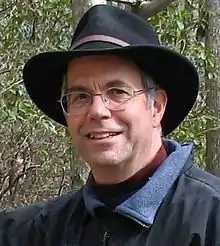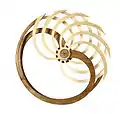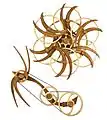David C. Roy
David C. Roy is a kinetic sculptor.[3][4] He has designed over 150 different moving sculptures and produced one-of-a-kind or limited edition instances of each: In total he has hand-built thousands of pieces.[5][6]
David C. Roy | |
|---|---|
 David C. Roy, Kinetic Sculptor in 2006 | |
| Born | 1952 |
| Education | Boston University |
| Known for | Spring-driven kinetic sculptures of wood |
Notable work | Dimensions - capable of running 40 hours on a single wind[1] |
| Movement | Kinetic art |
| Spouse(s) | Marjorie E. "Marji" Roy, 1974-present[2] |
| Website | woodthatworks |
Education and career
Roy's father was an aeronautical engineer working on jet engines, and as a boy he was interested in invention and science. In 1974, Roy received a degree in physics from Boston University and then got a job as a computer programmer for an insurance company until becoming a sculptor in 1975.[7][8][9] The idea for the career direction came from his wife-to-be, Marji, who was at the time an art student at Rhode Island School of Design.[8]
His sculptures, which are mainly made from laminated Baltic birch hardwood, are not timepieces but they do include clockwork-like mechanisms such as escapements, suspended weights, counter-weights, and (more recently) constant force springs.[1][10][11] They are not electrically powered because an important connection is that the viewer winds the piece by hand.[12] The run time of early models was about 30 minutes, but he has refined the technique to the point that some run up to 40 hours on a single full wind.[13] Many include the moving moiré pattern from co-axial spoked wheels rotating in opposite directions.[14] Roy focuses not only on the motion but also the sound. He has developed escapements that are either nearly silent or that produce the soft clicking of wood on wood.[15] A few incorporate wind chime tubes.[5] In the beginning he hand drew his schematics, but he has gradually migrated to computer-assisted design and animation.[16][17]
His studio is in Ashford, Connecticut.[2]
Reception
His work has been displayed since the late 1970s in science and art museums, in art galleries, and is in corporate and private collections around the world.[18] His work and life has been covered in publications including the New York Times,[19][20] Discover magazine,[21] the Hartford Courant,[22] and the Boston Globe.[23] Writing for the Baltimore Evening Sun, Carl Schoettler waxed poetically that "Echo ... looks like a spinning wheel for ghost tales at midnight. Serendipity ... might measure rainbows."[24] Bill Aller of the New York Times found them "intriguing."[20] A turning point in Roy's career was acceptance to exhibit at the Northeast Craft Fair in Rhinebeck, New York.[12] Reviewing this exhibit at the 1979 show, Nancy Pappas of the Hartford Courant was impressed with the sculptures' "silent, hypnotic motion."[25] In the Journal Inquirer Richard Tamling wrote about the "...constantly shifting relationships among shapes - as occurs in mobiles - as well as motion and sound[26] In InformArt Magazine, Tyler Chartier found the moving parts create "...wondrous patterns that spin, swirl, flutter, and undulate in the most entrancing ways."[27] Writing for American Woodturner Journal, Peter Rand observed that the motion in the pieces is "...intriguing in its sequence, which is infused with rhythm and evolves over time."[28]
Gallery
 Inventor Released was the third kinetic sculpture from the beginning of his career in 1976. It was weight driven and reflects his goal to make sustained motion in a sculpture.
Inventor Released was the third kinetic sculpture from the beginning of his career in 1976. It was weight driven and reflects his goal to make sustained motion in a sculpture. Dimensions is a spring-driven kinetic sculpture designed in 2015. A three-dimensional torus appears in the patterning wheels when the correct directions and speeds are reached.
Dimensions is a spring-driven kinetic sculpture designed in 2015. A three-dimensional torus appears in the patterning wheels when the correct directions and speeds are reached. Nautilus is a spring-driven kinetic sculpture designed in 2014. It features visually interesting complex and varied motion from a simple mechanism.
Nautilus is a spring-driven kinetic sculpture designed in 2014. It features visually interesting complex and varied motion from a simple mechanism. Solo is a spring-driven kinetic sculpture designed in 2014. The motion of flight has been a recurring theme in his work first appearing in 1988 in a sculpture called Flight.
Solo is a spring-driven kinetic sculpture designed in 2014. The motion of flight has been a recurring theme in his work first appearing in 1988 in a sculpture called Flight. Variation II Sun is a spring-driven kinetic sculpture designed in 2014. Roy has been inspired by kaleidoscopic patterning throughout his career.
Variation II Sun is a spring-driven kinetic sculpture designed in 2014. Roy has been inspired by kaleidoscopic patterning throughout his career.
References
- Ouellette, Jennifer (2015-09-14). "These Cool Kinetic Sculptures Can Run 40 Hours After a Single Wind of the Spring". Gizmodo. Retrieved 2016-01-05.
Each machine relies on a constant force spring ... earliest sculptures employed a suspended weight to induce the motion, much like a pendulum clock.
- Crockett, Zachary (2015-05-13). "The Kinetic Wood Sculptor". Priceonomics. Retrieved 2016-01-05.
Today, from a small Ashford, Connecticut wood shop,
- Beschizza, Rob (2006-11-06). "The Kinetic Wood Sculptures of David Roy". WIRED. Retrieved 2016-01-05.
Since 1975 David has created dozens of these curious works of art
- "Now That's Craftsmanship, Boyo". WIRED. 2004-04-22. Retrieved 2016-01-05.
- Roy, David (2011-09-16). "TEDxBGSU - DAVID ROY- KINETIC SCULPTOR". TEDx Talks YouTube Channel, TEDxBGSU, Bowling Green State University, Bowling Green, Ohio. Retrieved 2016-01-05.
...he has designed and handcrafted over 150 different limited edition and one-of-a-kind kinetic sculptures and built thousands
- Roy, David C. "Portfolio". Retrieved 2016-01-09.
- Abrams, Michael (November 2015). "The Beauty of Movement". American Society of Mechanical Engineers. Retrieved 2016-01-05.
...engineering scholarship to Boston University. He switched to chemistry for a while and eventually received a degree in physics.
- "Once a physicist: David Roy". Physics World (Institute of Physics, UK). February 2010. Retrieved 2016-01-05.
Towards the end of my degree, I started spending time at the Rhode Island School of Design, where my future (and present!) wife Marji was studying sculpture and art education.
- Kim, Damon; Carlson, Patricia (December 1977). "Small Business and Crafts: Wooden Kinetics". Yankee Magazine. 41 (12): 131.
By the summer of 1975 ... David quit his job in insurance and began working full time on...
- Worrell, Pat (Summer 2002). "All the Right Moves". AmericanStyle Magazine. 8 (4): 80.
The "arms" at the top of David C. Roy's Geppetto ... are counter-weighted by long "legs" that frame the left side of this movable piece.
- Mok, Kimberley (2015-09-18). "These mesmerizing kinetic sculptures run up to 40 hours without electricity". TreeHugger. Retrieved 2016-01-05.
I started using the springs and never looked back.
- Schiro, Anne-Marie (1980-06-28). "America's Craftsmen Gather at Rhinebeck". The New York Times. p. C1.
The idea is for you to put in your energy, then sculpture runs for half an hour to an hour
- Jobson, Christopher (2015-09-14). "These self-propelled kinetic wood sculptures by David C. Roy can spin for nearly a day". Colossal. Retrieved 2016-01-05.
mechanical wind-up mechanisms without the aid of electricity ... capable of whirling around for a whopping 40+ hours.
- Roy, David C. (December 2010). "Principles of Design, Kinetic Art" (PDF). Northwest Woodturners Newsletter. 17 (12).
...wheels so they always move at the same pace but in opposite directions...
- Ehrlich, Lara (Spring 2016). "Art in Motion". Boston University, College of Arts and Sciences magazine. Retrieved 2017-03-26. includes a video How to Make a Kinetic Sculpture
- MacWorld, Macintosh Master Calendar. April 1991.
Roy designs all his kinetic sculptures using Illustrator 88. He uses Swivel 3D and MacroMind Director to produce animated prototypes.
- Bedford, Mike (September 2001). Computer Shopper UK: Sculpture Club. p. 320.
...using Adobe Illustrator on an Apple Mac is just the start.
- "'Energy Sculpture' at Bruce Museum – a visual motion study". The Greenwich Times. 1983-03-12.
- Malarcher, Patricia (1986-12-07). "CRAFTS; A Guide To Holiday Shopping". The New York Times. Retrieved 2016-01-05.
Also featured here are mesmerising kinetic sculptures by David Roy...
- Aller, Bill (1979-05-24). "Handmade Crafts by Theater Artists". The New York Times (subscription required).
Some of the more intriguing pieces are kinetic wall sculpture by Dave and Margie Roy
- Kim, Scott (2003-10-01). "Bogglers: Spinning". Discover Magazine. 24 (10): 83. Retrieved 2016-01-05.
David Roy is an artist in Ashford, Connecticut, who has always been fascinated by motion and mechanics.
- Croft, Jack (1987-02-20). "Couple toy with kinetics, succeed in business". The Hartford Courant, Eastern Edition. p. D3.
- Temin, Christine (1982-05-27). "Critic's Tip: Exhibits: Sculpture that does things". The Boston Globe.
- Schoettler, Carl (1978-02-17). "Some Ado About Machines Working Well Doing Nothing". The Evening Sun, Baltimore.
Echo ... looks like a spinning wheel for ghost tales at midnight. Serendipity ... might measure rainbows.
- Pappas, Nancy (1979-06-22). "Rhinebeck: A Crafts Mecca". The Hartford Courant.
...wind-up weights attached to almost-invisible strings can keep the sculptures in silent, hypnotic motion for as much as three hours at a stretch.
- Tamling, Richard (1984-06-25). "Sculpture that Performs deserving of Applause". Journal Inquirer. p. 23.
...figures that travel - that spin, somersault and rotate - and form shifting constellations of shapes ... constantly shifting relationships among shapes - as occurs in mobiles - as well as motion and sound.
- Chartier, Tyler W. (Fall 2004). "David Roy – Sculpture in Motion". InformArt Magazine. 15 (4): 46.
[The real art] is a visual interplay between the different physical pieces that creates wondrous patterns that spin, swirl, flutter, and undulate in the most entrancing ways.
- Rand, Peter (February 2012). "Turning to the Next Dimension. Real Movement in Turned Objects". American Woodturner Journal (subscription required). 41 (12): 38–45.
Motion in these geometric pieces is complex, of variable speed and pattern formation, and intriguing in its sequence, which is infused with rhythm and evolves over time.